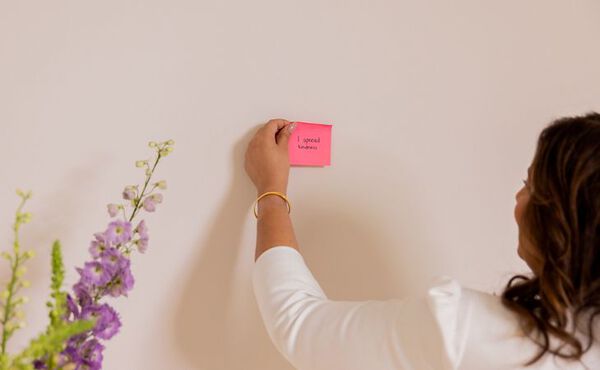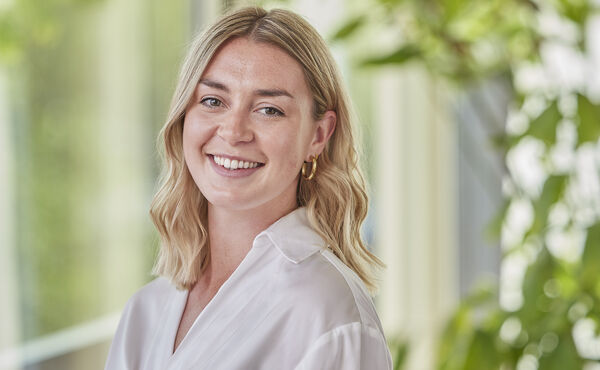Newsflash: Life is set up to knock you out of touch with yourself, here’s how to find your way back.
If you’re feeling lost, dissatisfied or stuck in a rut, you might be lacking purpose in life. However, what could be reassuring to hear – is it’s probably not your fault. Our purpose expert Ani Naqvi explains how the modern Western way of life is set up to make us feel disconnected from our authentic selves, and what we can do to change that.

What does it feel like when you’ve found your purpose?
“Your purpose serves as a guiding light,” explains Ani. “It's your north star with everything you do in life personally and professionally. You feel a sense of fulfilment, contentment and satisfaction, peace, joy and harmony to name a few. Finding purpose fills you up from within and gives you meaning in life.” To find our purpose, we need to listen to our authentic wants and needs. Why is it then, that so many of us don’t? Here are the three big reasons you may be struggling to hear that voice.
1. Fear
As young children, the world is our oyster – we’re free to explore activities and interests with no other agenda than enjoyment. However, as we get older there’s more pressure put on these interests. Are we good at them? Will they bring us money? Are they a productive use of our time? “As we grow up, the veil of fear comes over us,” explains Ani. “The things that we need or want in life become clouded by our parents’ anxiety about us getting good grades, a good job and a salary. The entire school system is geared up for competition and survival of the fittest.’
Whether it’s from our parents, teachers or friends, we learn that failure is something to fear.
“Fear is a normal part of the survival brain,’ explains Ani. ‘It's what stops us from walking into traffic, but what we don't want, is for fear to dictate our lives. Fear is created in our minds, so it's a perceived psychological threat, but it's not real. Research says we can have up to about 100,000 thoughts a day, most of which are running in the unconscious or in the subconscious.”
Psychiatrist Carl Jung said: “until you bring the unconscious into the conscious, it will drive your life, and you will call it fate.” We’ve all got a script running in the background, and that script is based on our life experience. Because of our brain’s natural negativity bias, we are more likely to remember insults rather than praise and recall negative events over positive ones. To overcome fear, you need to challenge this bias by working on your mental fitness.
TRY IT: Facing your fears
The key to overcoming fears is to replace our negative thoughts with positive ones. Ani has three steps for this: notice it, name it, and neutralise it.
Notice it
“The first step is to create awareness of what you're subconsciously thinking. If you don’t know that your script is running unconsciously in the background, giving you all these kinds of fearful messages, then of course that's what your reality is going to be.”
The next time you have a negative thought come into your mind, just take a second to acknowledge it.
Name it
The next second step is intervening. Our mind has lots of different types of sabautours – when you notice one comes up, call it out. Whether it’s my anxiety or my people pleaser, give it a name so you can separate it from the rest of your thoughts.
Neutralise it
“Now you have named it, you can do what’s called the ABC of thoughts,” says Ani.
If your thought is ‘I am never going to be successful’, run it through the following filter of 3 questions:
Is it Accurate? - Ask yourself if that thought is really true. Have there been times when you have already been successful, at anything, at any time? If the answer is yes, then it’s not an accurate thought.
Is it Balanced? - ‘Never’ is an absolute, so be aware of what you’re saying and make sure you’re not exaggerating on the negative.
Is it Complete? - Question and challenge these negative beliefs and thoughts. Is this thought a ‘fact’ or are you sabotaging?
When you analyse your negative thought with the ABC method, you’ll probably answer no to at least one -if not all - of these questions, just think of all those successes you’ve had throughout your life!
So, you can discard that negative thought and replace it with the opposite positive affirmation. In this case, you would repeat to yourself ‘I am successful’.
“Imagine that your brain is like a garden of weeds,” explains Ani. “Throughout the day we have to regularly go in and take out all the weeds. Then, we plant seeds, so that eventually you can shift your brain from a garden of weeds to a garden of flowers.”
2. Society’s structure
When we leave school, capitalism has its play in shaping our view of success. With a focus on making money and being on top, we're pushed to think our value depends on how much we earn. Chasing after wealth can make us forget about what truly matters to us, leaving us feeling lost and unfulfilled.
“The more material that you are, the more that you rely on material things. When you desire a lot of things, then you can't be content with the simple things in life” explains Ani. “I’ve learnt to be happy and content with whatever we've got. I had a cancer diagnosis and I didn't earn any money for about five years. I had to rent my flat out in London. We moved to many places overseas, Thailand, Greece and India to name a few, living in basic accommodation, but it wasn't important either. It was more important to be in a stress-free environment, in a simple place that was cheap because we didn't have a lot of money. I was barefoot, on the beach and just having a very simple sort of easy life. Whereas, before when I was in London, I had all the handbags and the shoes and the fancy clothes, clopping away to work but I was miserable. And that's probably contributed to my cancer. So that was all part of my healing journey, letting go of all of that stuff.” Sometimes a lack of purpose is down to a lack of perspective. Realising what success means to you (rather than to society) and how valuable you are will make you feel more fulfilled.
TRY IT: Practice gratitude
This is not groundbreaking advice, but often when we think about what we are grateful for, it’s external, its the people or things we have around us. What can really boost your sense of purpose is to focus your appreciation on the person you are and what you can give to the world. “On a daily basis, remind yourself of all of your amazing qualities,” says Ani. “Having unconditional love for yourself, helps us give unconditional love to others as well - that's how we create a conscious movement to make the world a better place. When we love ourselves, we're not judging ourselves. Then we're not judging others, we are more compassionate and that's raising all of our consciousness levels so that we're then creating the kind of world that we want to be living in.” Try keeping a graititude diary, each day wrote down something you are grateful for about yourself. In tough times, you might find it useful to look back at these and remind yourself of all the ways you give meaning to your life and others.
3. Multitasking
“People think that multitasking is good, it’s not,” explains Ani. “We can't really multitask. It’s very bad for the brain. We should be doing one thing at a time, so if your brain is constantly full all the time, you don't have the space to create and get inspired. If you’re travelling to work, you're probably scrolling on your phone or doing something else at the same time. People are rarely just present. We're not human doings, we're human beings. There's been research that shows your brain needs time to get bored. In order for you to feel inspired, you need to get to the place of boredom where your brain is just idling - that's when inspiration strikes.
"We're not human doings, we're human beings."
The more time that you can spend just being present with yourself and with what's around, that's when your soul is then able to speak to you and you're able to hear it. Otherwise, it's lost under the noise of all the chitter chatter in your head. That’s where our fears and saboteurs live.’
TRY IT: Master the magic of mindfulness
“Next time you get on the train, a bus, or any sort of public transport, instead of reading, listening to music or scrolling on your phone, just take the time to notice your surroundings,” advises Ani. Ask yourself:
- Who's around?
- What are they doing?
- What's the scenery like outside?
“Stare out the window, watch the rain or the sunshine. Even try smiling at your fellow commuters,” suggests Ani. People often talk about ‘soul-searching’ and it’s become somewhat of a cliché, but spending time with yourself without distractions can be enlightening. “Just walk around your neighbourhood,” suggests Ani. “It’s literally about taking the time to smell the roses. It’s those moments of presence and mindfulness that are going to help you to reconnect with your true being. We can only connect with our true self, our spiritual self if we’re allowing that space. We convene with our spirit when we are quiet in their mind.’
From perfectionism to self-doubt, there are lots of other behaviours that could be holding you back from becoming the best version of you. On her website, our expert Ani has created a quiz to reveal whether you could be self-sabotaging, take it yourself here.
This article is part of our How to Find Your Purpose masterclass, a series of articles and videos designed to help you live a life with more meaning. If you want to start debunking the myths around purpose, reveal what makes your heart beat faster and bring more joy into your life, you can find the rest of the content here.
-
Skatīt visu€ 5,00
-
Skatīt visu€ 17,90










